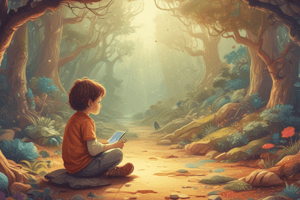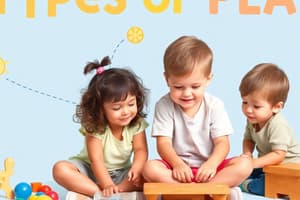Podcast
Questions and Answers
What is the primary function of play in children according to Groose's perspective?
What is the primary function of play in children according to Groose's perspective?
- To develop social skills and relationships
- To explore and understand the environment
- To practice basic life skills (correct)
- To express emotions and feelings
What is the underlying drive behind children's play, according to Groose?
What is the underlying drive behind children's play, according to Groose?
- Curiosity and exploration
- Social influence and peer pressure
- Imitation of adults
- Instinct (correct)
What is the main characteristic of play, as described by Groose?
What is the main characteristic of play, as described by Groose?
- Unstructured and spontaneous
- Cognitive and problem-solving
- Instinctive and practice-based (correct)
- Structured and goal-oriented
What is the primary benefit of play, according to Groose's perspective?
What is the primary benefit of play, according to Groose's perspective?
What is the underlying assumption of Groose's perspective on children's play?
What is the underlying assumption of Groose's perspective on children's play?
What is Margaret McMillan's role in education?
What is Margaret McMillan's role in education?
What is the quote about the role of parents?
What is the quote about the role of parents?
Who is the pioneer in nursery education?
Who is the pioneer in nursery education?
What is the focus of Margaret McMillan's work?
What is the focus of Margaret McMillan's work?
What does the quote imply about the role of parents?
What does the quote imply about the role of parents?
What is the primary goal of balancing subject matter and gameplay in educational games?
What is the primary goal of balancing subject matter and gameplay in educational games?
What happens when gameplay is not engaging in an educational game?
What happens when gameplay is not engaging in an educational game?
What is the implied role of Groose's perspective on children's play in shaping childhood development?
What is the implied role of Groose's perspective on children's play in shaping childhood development?
What is the result of prioritizing educational content over gameplay in an educational game?
What is the result of prioritizing educational content over gameplay in an educational game?
What is the key to creating an effective educational game?
What is the key to creating an effective educational game?
Which of the following statements is a logical inference based on Groose's perspective on play?
Which of the following statements is a logical inference based on Groose's perspective on play?
Why is it important to ensure that gameplay reinforces educational content in an educational game?
Why is it important to ensure that gameplay reinforces educational content in an educational game?
In the context of Groose's perspective, what is the primary distinction between play and other childhood activities?
In the context of Groose's perspective, what is the primary distinction between play and other childhood activities?
What is the underlying assumption about children's nature in Groose's perspective on play?
What is the underlying assumption about children's nature in Groose's perspective on play?
How does Groose's perspective on play relate to the concept of childhood innocence?
How does Groose's perspective on play relate to the concept of childhood innocence?
What is the primary source of influence on children's play?
What is the primary source of influence on children's play?
What is a key feature of children's play in the real world?
What is a key feature of children's play in the real world?
What is the role of desires in children's play?
What is the role of desires in children's play?
What is the nature of children's play in relation to the real world?
What is the nature of children's play in relation to the real world?
What is the primary characteristic of children's play?
What is the primary characteristic of children's play?
Flashcards are hidden until you start studying
Study Notes
Definition of Children's Play
- According to Groos (1901), play is an instinctive means for children to practice basic life skills.
Importance of Play in Learning
- Ensuring balance between subject matter and gameplay is crucial, as it engages players while reinforcing educational content.
Role of Parents in Early Education
- Parents are considered the first educators in a child's life, as stated by Margaret McMillan, a pioneer in nursery education.
Features of Children's Play
- Children's play is determined and controlled by their desires, and is not influenced by the tough realities of the real world.
- Play is a way for children to practice and develop life skills in a controlled environment.
Studying That Suits You
Use AI to generate personalized quizzes and flashcards to suit your learning preferences.




